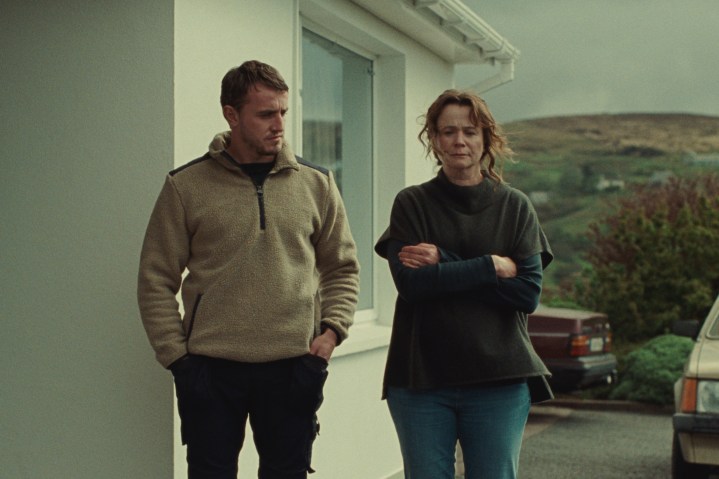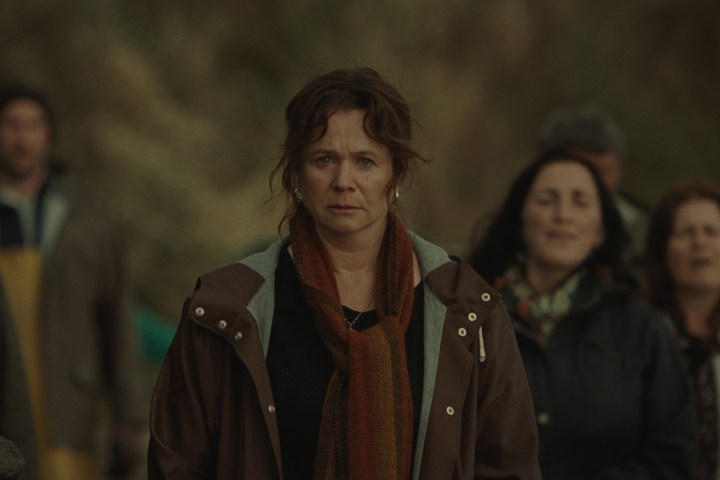From its chaotic, underwater first frame all way to its liberating, sun-soaked final shot, God’s Creatures is full of carefully composed images. There’s never a moment across the film’s modest 94-minute runtime in which it feels like co-directors Saela Davis and Anna Rose Holmer aren’t in full control of what’s happening on-screen. Throughout much of God’s Creatures’ quietly stomach-churning second act, that sense of directorial control just further heightens the tension that lurks beneath the surface of the film’s story.
In God’s Creatures‘ third act, however, Holmer and Davis’ steady grip becomes a stranglehold, one that threatens to choke all the drama and suspense out of the story they’re attempting to tell. Moments that should come across as either powerful punches to the gut or overwhelming instances of emotional relief are so underplayed that they are robbed of much of their weight. God’s Creatures, therefore, ultimately becomes an interesting case study on artistic restraint, and, specifically, how too calculated a style can, if executed incorrectly, leave a film feeling unsuitably cold.

To its credit, God’s Creatures’ detached style isn’t entirely misplaced. The film’s coldly removed approach not only suits the windy, hard-edged Irish village in which it’s set, but it also reflects the understated, reserved way that so many of its residents prefer to carry on with their lives. That includes Aileen O’Hara (Emily Watson), a well-respected mother who runs the floor at her village’s local fishing depot. Between her estranged relationship with her son, Brian (Paul Mescal), and the constant care that her disabled father, Paddy (Lalor Roddy), requires, there’s already plenty weighing Aileen down when God’s Creatures begins.
You wouldn’t know that at first, though, because Aileen does her best to keep her emotional baggage hidden. It’s only during certain instances of quiet contemplation that the weight of Aileen’s trauma becomes apparent, but those moments become increasingly more common once Mescal’s Brian makes a surprise return to his hometown after spending a number of years abroad. His return triggers Aileen’s most maternal, self-destructive impulses, which take the form of gestures that put her own life at risk in favor of improving Brian’s.
The limits of Aileen’s love for her son are tested, however, when Brian is suddenly accused of raping Sarah Murphy (Aisling Franciosi), a young girl in town that he used to date. When Aileen is called into the local police station out of nowhere in the middle of the night, she is asked to corroborate an alibi for Brian that she knows isn’t true. While she initially does so without hesitation as well, the repercussions of her decision quickly begin to take a toll not only on her but the entirety of the Irish town that she calls home.

The fallout of Brian’s violent act against Sarah gradually unfolds over the course of God’s Creatures‘ patient second half, which follows Aileen as she becomes increasingly uncertain about whether or not she made the right decision in protecting her son. That doubt, which steadily eats away at her, manifests itself as a series of silent gazes that only become increasingly guilt-ridden the closer Aileen gets to God’s Creatures’ surprisingly brutal finale.
Had Aileen been played by anyone other than Emily Watson, the film’s third act, which rests the weight of its story entirely on her character’s shoulders, likely would have fallen completely flat. Fortunately, Watson remains one of our most intelligent, commanding performers, and in God’s Creatures, she beautifully navigates the conflicting emotions that are raging within Aileen for much of the film’s second half. Opposite her, Mescal (soon to be seen in another A24 drama, Aftersun) turns in a deceptively understated, quietly unsettling performance as Brian, Aileen’s entitled son.
While she isn’t given as much time to explore her character as Watson and Mescal are, either, Aisling Franciosi also gives a vulnerable, movingly dignified performance as Sarah, the woman at the center of God’s Creatures’ plot. Together, Franciosi, Mescal, and Watson bring the necessary gravity to God’s Creatures that its stiflingly restrained screenplay doesn’t. The three actors are not, however, capable of totally lifting God’s Creatures up to the heights that it could have reached had it been allowed to be a bit more emotionally direct or forthright.

Behind the camera, Holmer and Davis bring as much directorial sophistication to God’s Creatures as they can, delivering shots that are both deceptively simple and visually layered. In one of the film’s more ingenious visual moments, Holmer and Davis even place Watson in the center of their frame only to have her lean out of view at the exact moment that Mescal’s Brian enters the pub door behind her. The image is the result of several incredibly well-timed physical movements as well as Holmer and Davis’ keen eye for blocking, which allows them to place Watson directly in the same line of sight as the door that Mescal eventually walks through.
That said, it’s not Brian’s surprise barroom entrance in God’s Creatures’ first act that feels the most emblematic of the film’s strengths and weaknesses. That honor, instead, goes to the film’s opening moments, which see Holmer and Davis transition from several handheld, unwieldy underwater images to one long, far away shot of the sea. The film’s initial handheld shots are, notably, accompanied by the visceral screams of someone drowning, but by the time Holmer and Davis have moved on to their long shot of the sea, their victim’s muffled screams have been replaced by silence.
These opening minutes perfectly encapsulate the film itself, which contains more than its fair share of gripping and intense scenes but frequently chooses to place itself at an emotional distance that doesn’t suit the story it’s telling. For that reason, it doesn’t come as much of a surprise when God’s Creatures makes the odd last-minute decision to turn its focus away from Aileen just when her emotional journey has begun to reach its thorniest and most compelling places. In the end, this is a film that will always choose a distant, unmoving shot of the sea over the submerged perspectives of its characters, and that’s why God’s Creatures ultimately fails to dive as deeply as it should.
God’s Creatures hits theaters and VOD on Friday, September 30.
Editors' Recommendations
- Rosaline review: Kaitlyn Dever lifts up Hulu’s Romeo and Juliet rom-com riff
- Amsterdam review: An exhausting, overlong conspiracy thriller
- Entergalactic review: a simple but charming animated romance
- The Woman King review: a thrilling period epic
- The Whale review: Brendan Fraser can’t save this histrionic drama




